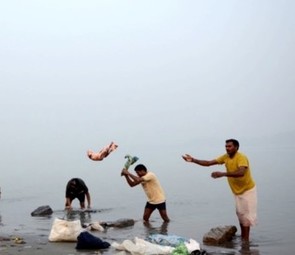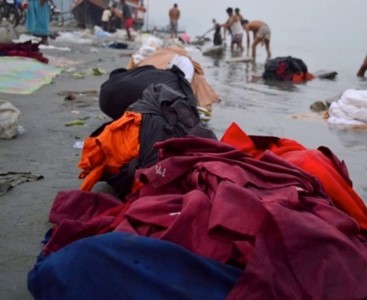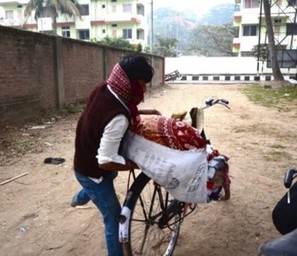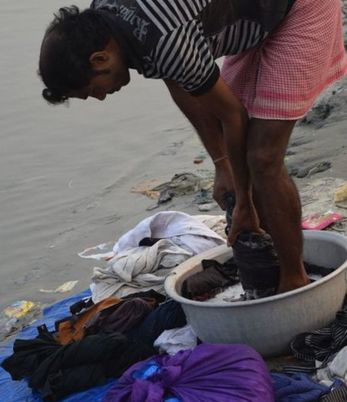Burden of Cloths We Wear: A look into the lives of Indian Dhobis
Dhobis at BrahmaputraThe Hindi word for the people who make a living through washing cloths is 'Dhobi'. Here they are washing cloths at the banks of river Brahmaputra
|
Bundle of cloths at the bankDhobis bring the cloths to the river bank to be washed. The river water is used for washing and rinsing and waste water is drained back into the flow.
|
Washed cloths being transportedThe Dhobis are mostly financially poor and have limited resources. Their work involves physically strenuous and hazardous activities throughout the day.
|
Research on identification of needs and problems of the Dhobi Community in Guwahati.
|
Funding : Procter and Gamble R&D and Supply Network Organization, Brussles
Duration: January 2016 - August 2016 Members at IIT Guwahati: Pankaj Upadhyay, Keyur Sorathia |
According to the 2001 Indian census data, the number of Dhobis in India is estimated to be approximately 400,000 people with 56% and 44% in urban and rural India respectively. Although during the course of the project we interacted with many Dhobis, no formal studies could be found on the exact number of Dhobis in Guwahati. We found two groups of people, one who were part of an established commercial entity which operated as Dry cleaning and washing services and the other who operated the washing business out of their homes individually and had no affiliation to an organization. We termed the former group as 'Structured' Dhobis, since they were part of a structured organization and worked as employees and the latter group as 'Unstructured' Dhobis. The aim of our project was to identify the needs and problems of structured and unstructured Dhobis who worked in Guwahati, Assam. Our intention was to develop a good understanding of the entire ecosystem and come out with design briefs for developing product or system level interventions.
We adopted a qualitative methodology and conducted the study through contextual inquiry, semi-structured interviews and photo and video analysis. Our objectives were to understand the nuances of the context in which the Dhobis worked, their behavior in their work lives, the environment they worked in and the processes that were involved. What emerged out of a nearly six month study was a treasure trove of insights and revelations. We concentrated the learning from these studies into strong design briefs with an in depth understanding of the context, constraints and possibilities. This Research project was taken forward into Phase II, with the aim of developing product and system level intervention for some of the identified design problems. Acknowledgements: We would like to thank Adithya Hairam, P&G for the immense help and contribution he provided throughout the project. The investigators of this project would also like to thank the amazingly capable team of Master of Design (2016) students who helped in conducting the research: (in no particular order) Keshav Venkatesh, Nikhil M, Betson George, Digjot Singh, Gunjan Sobhani, Akash Mohan, Sreenath S P, Durgesh Bhawsar, Naresh Kumar Koppu, Balla Tej Kumar, Aakash Yambha. Cheers Guys! |





